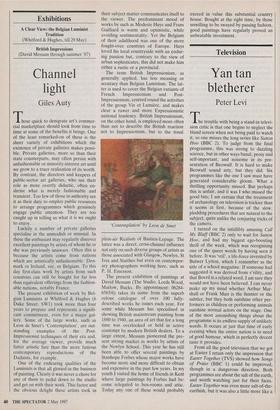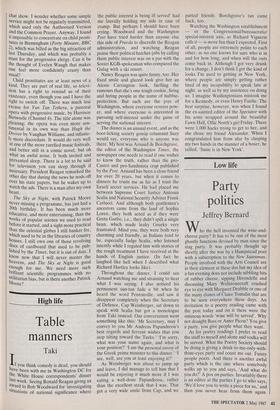Television
Yan tan bletherer
Peter Levi
The trouble with being a stand-in televi- sion critic is that one begins to neglect the bland screen when not being paid to watch it, so one misses the long series like Sutton Hoo (BBC 2). To judge from the final programme, this was strong to dazzling science, but in other ways banal, prosy and self-important, and noisome in its pre- sentation of Beowulf. It is hard to make Beowulf sound arty, but they did. Six programmes like the one I saw must have generated considerable gloom. What a thrilling opportunity missed. But perhaps this is unfair, and it was I who missed the good bits; I am certain that the treatment of archaeology on television is trickier than it seems at first, because of the slow, plodding procedures that are natural to the subject, quite unlike the conjuring tricks of the camera.
I turned on the infallibly amusing Call My Bluff (BBC 2) only to wait for Sutton Hoo, and had my biggest ego-boosting thrill of the week, which was recognising one of the queer words by having seen it before. It was `vril', a life-force invented by Bulwer Lytton, which I remember as the title of a school magazine. If someone had suggested it was derived from v'rility, and that Bovril is a related word, I am sure they would not have been believed. I can never make up my mind whether Arthur Mar- shall or Frank Muir is the funnier or the subtler, but they both outshine other per- formers as children or performing animals outshine normal actors on the stage. One of the most astonishing things about the programme is its endless supply of unlikely words. It occurs at just that time of early evening when the entire nation is in need of good humour, which in perfectly decent taste it provides.
From all the good television that we got at Easter I retain only the impression that Easter Together (TVS) showed how Songs of Praise (BBC 1) could be improved, though in a dangerous direction. Both programmes are about the salt of the earth, and worth watching just for their faces. Easter Together was even more salt-of-the- earthish, but it was also a little more like a
chat show. I wonder whether some simple service might not be regularly transmitted, which used only the Authorised Version and the Common Prayer. Anyway, I found it impossible to concentrate on child prosti- tutes in Birmingham (Forty Minutes, BBC 2), which was billed as the big attraction of last Thursday, and which was probably a must for the progressive clergy. Can it be the thought of Evelyn Waugh that makes one feel more confidently crusty than usual?
Child prostitutes are at least news of a kind. They are part of real life, so televi- sion has a right to remind us of their existence, even though you and I have the right to switch off. There was much less excuse for Yan Tan Tethera, a pastoral opera with progressive music, by Harrison Elirtwistle (Channel 4). The title alone was pleasing; the opera was even more sen- timental in its own way than Hugh the Drover by Vaughan Williams, and infinite- ly more discordant. It would do very well at one of the more rarefied music festivals, and better still in a comic novel, but oh what an awful noise, It both invited and Prevented sleep. There is a lot to be said for television you can sleep through if necessary. President Reagan remarked the other day that during the news he nods off over his state papers, but he wakes up to watch the ads. There is a man after my own heart.
The Sky at Night, with Patrick Moore never missing a programme, has just had a 30th birthday. It has been much more educative, and more entertaining, than the works of popular science we used to read before it started, and a sight more practical than the celestial globes I still hanker for, which used to be in the libraries of country houses. I still own one of those revolving discs of cardboard that used to be pub- lished by the Times, but it is out of date. I know now that I will never master the heavens, and The Sky at Night is good enough for me. We need more such brilliant scientific programmes with no utilitarian bias, but is there another Patrick Moore?



















































 Previous page
Previous page